Hebraic Studies -
Why Should I Learn Torah?
Please Note: Firefox and some other Search Engines may not be suitable
Use Google Chrome for this Web Page to load perfectly!
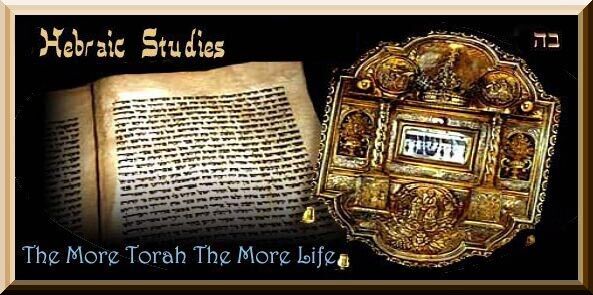
Why Should I Learn Torah?
With
Please Note: On this page I may show the four
letter blessed *“Memorial Name” of the Almighty
in Ivrit - ![]() - Y-H-V-H, which we usually pronounce
as “Adonai” or “HaShem”.
- Y-H-V-H, which we usually pronounce
as “Adonai” or “HaShem”.
*“This is My Name forever,
and this is My memorial to all generations.”
Shemot - Exodus 3:15.
Although some minor alterations have been made relating to names and attributes having been corrected.
Please Note: Verse numbers
may at times vary in non-Jewish Bibles.
Please do NOT visit this site on Shabbat or on a Yom Tov (Feasts)!
![]()
The question frequently asked of me is as follows; “Why should I learn the Torah, and what benefit will I receive from learning it”. It really amazes me that a Jew asks me this, for is it not the most important thing we should know as part of our faith.
In Judaism the very heart is the wonderful mitzvah of being able to the study of our beloved Torah, for obviously it is more than just the Law, for it also contains so much detail of our very beginning, when Elohim gave the land to Avram
“And ![]() said
unto Avram, after that Lot was separated from him: 'Lift up now thine eyes, and
look from the place where thou art, northward and southward and eastward and
westward for all the land which thou seest, to thee
will I give it, and to thy seed for ever” Bereshit - Genesis 13:14-15.
said
unto Avram, after that Lot was separated from him: 'Lift up now thine eyes, and
look from the place where thou art, northward and southward and eastward and
westward for all the land which thou seest, to thee
will I give it, and to thy seed for ever” Bereshit - Genesis 13:14-15.
And of course as we continue we will also read
about the miraculous Exodus from Mitzraim (
The truth is we should have a better understanding of the teachings that are so vital of our Hebraic faith. This philosophy must bring to light the ultimate good that man is able to attain from the adherence from living a way of life based on what we are taught in the wonderful Torah.
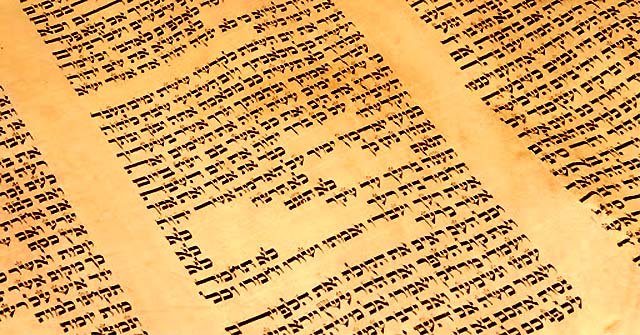
Here
we see a part of an open Torah Scroll
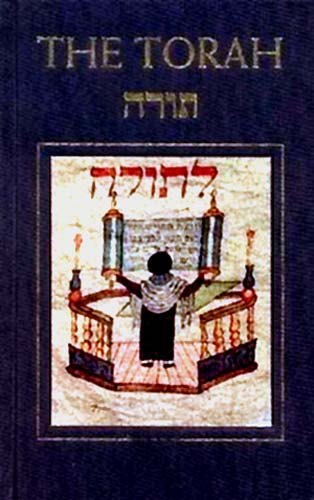
Excellent ![]() Torah editions containing the Five Books of
Moshe -
Torah editions containing the Five Books of
Moshe -
Hebrew and English are available from any Jewish Bookstore by various publishers
Judaism is not just a religion, and by religion I do mean doing those things that we as humans normally tend to satisfy the normal instinct in us. Obviously, many forms of this satisfaction are prohibited in the Torah, and may even be deemed to be evil. Judaism considers its greatest adversary the unbridled religious emotion of man. This sadly can reach in the ultimate manifestation of idolatry. Judaism is a unique metaphysical and philosophical system. Its insistence on knowledge as the only means of determining its practice and the worship of our blessed Creator and this distinguishes us from all other religions. Judaism demands of man a certain level of knowledge and understanding their faith and those things that Elohim has taught us so long ago!
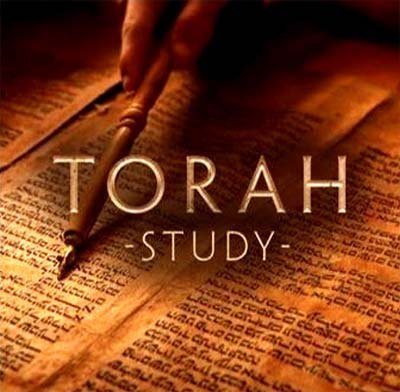
Remember studying in English or whatever your language is will be just fine
But do try to learn Hebrew whenever it becomes possible!
Obviously falsehood is equated with evil,
whilst truth and living a good life, combined with knowledge and understanding
of the Torah makes us a better and a faithful person. And friends, it is
precisely for this reason that we were given the Torah.
Judaism is the only faith that views knowledge as being indispensable for its practice and maintains that man finds his deepest fulfilment in knowledge.
“Say unto wisdom:
‘Thou art my sister’, and call understanding thy kinswoman”
Countless passages of the Torah and the prophets attest to this fact. For this reason the Jews were not supposed to believe in the Torah without witnessing the event at Sinai. Two passages of the Torah make this point exceedingly clear:
“And ![]() said unto Moshe: ‘Lo, I come unto thee
in a thick cloud, that the people may hear when I speak with thee, and may also
believe thee forever’” Shemot - Exodus 19:9 (Jewish Publication Society (JPS) version of the Torah).
said unto Moshe: ‘Lo, I come unto thee
in a thick cloud, that the people may hear when I speak with thee, and may also
believe thee forever’” Shemot - Exodus 19:9 (Jewish Publication Society (JPS) version of the Torah).
“The day that
thou stoodest before ![]() thy Elohim
in Horeb, when
thy Elohim
in Horeb, when ![]() said unto me: ‘Assemble Me the people,
and I will make them hear My words that they may learn to fear Me all the days
that they live upon the earth, and that they may teach their children’”
Davarim - Deuteronomy 4:10 (JPS).
said unto me: ‘Assemble Me the people,
and I will make them hear My words that they may learn to fear Me all the days
that they live upon the earth, and that they may teach their children’”
Davarim - Deuteronomy 4:10 (JPS).
As we well know there were many of the Israelites that lacked in religiosity and even abandoned the beneficial and knowledgeable ways of the Torah for a life of sheer nonsense, folly and sadly even idolatry. They were often rebuked for their misguided religiosity as in Yeshayahu - Isaiah 1:11-15 and 48:1-6 (JPS).
We must understand that falsehood is the enemy of the Torah, thus always remember that knowledge and understanding our beloved Torah is our stronghold.
“![]() is the true Elohim; He is the living Elohim and the everlasting King.
At His wrath the earth will tremble, and the nations will not be able to endure
His indignation. Thus you shall say to them: ‘The gods that have not made
the heavens and the earth shall perish from the earth and from under these
heavens.’” Yirmyahu
- Jeremiah 10:10-11.
is the true Elohim; He is the living Elohim and the everlasting King.
At His wrath the earth will tremble, and the nations will not be able to endure
His indignation. Thus you shall say to them: ‘The gods that have not made
the heavens and the earth shall perish from the earth and from under these
heavens.’” Yirmyahu
- Jeremiah 10:10-11.
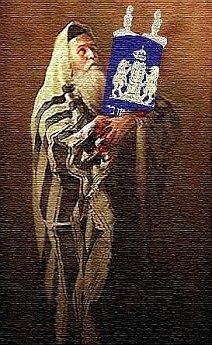 Judaism
does not fear honest scientific inquiry. Although we have
never had what we may call ‘a Galileo episode.’ Indeed not
one of our “baaley mesorah”
(authentic Torah scholars) has ever suggested the denial of any scientifically
demonstrated conclusions about the natural world. The most absurd idea
imaginable to Judaism is to suggest that we deny our senses or our minds. It
would mean the denial of the event of Sinai, the very basis of our Torah. No
true Torah scholar has ever suggested the denial of what we see with our eyes
and what is conclusively proven with our minds.
Judaism
does not fear honest scientific inquiry. Although we have
never had what we may call ‘a Galileo episode.’ Indeed not
one of our “baaley mesorah”
(authentic Torah scholars) has ever suggested the denial of any scientifically
demonstrated conclusions about the natural world. The most absurd idea
imaginable to Judaism is to suggest that we deny our senses or our minds. It
would mean the denial of the event of Sinai, the very basis of our Torah. No
true Torah scholar has ever suggested the denial of what we see with our eyes
and what is conclusively proven with our minds.
The true religion can only find support from
all sources of knowledge as all knowledge has as its source one Creator. What
Judaism does scorn is pseudo-intellectualism, rash decisions stemming not from
man's "
There is one portion of the Torah that is singled out from all others in terms of religious significance, the Shema (Davarim - Deuteronomy 6:4). We are required to recite it twice daily. We are further required to bind this portion to our arms and to our heads (men laying Tefillin) and to place Mezuzah’s on our doorposts. It is obvious, therefore, that of all the portions of the Torah, this one is considered to contain the most crucial and fundamental message.
The first statement, (and when we say it we
will say it like this) “Hear
O ![]() our Elohim,
our Elohim, ![]() is One,” contains three ideas: 1. The
existence of Elohim, 2. His Oneness, 3. and the fact that He
relates to us.
is One,” contains three ideas: 1. The
existence of Elohim, 2. His Oneness, 3. and the fact that He
relates to us.
However the Shema as written in the Torah continues like this;
“You shall love ![]() your Elohim with all your heart, with all your
soul, and with all your strength. And these words which I command you
today shall be in your heart. You shall teach them diligently to your children,
and shall talk of them when you sit in your house, when you walk by the way,
when you lie down, and when you rise up.” Davarim - Deuteronomy 6:5-8.
your Elohim with all your heart, with all your
soul, and with all your strength. And these words which I command you
today shall be in your heart. You shall teach them diligently to your children,
and shall talk of them when you sit in your house, when you walk by the way,
when you lie down, and when you rise up.” Davarim - Deuteronomy 6:5-8.
The third statement, “And these
words” further encourages us to study the Torah. Rashi tells us that this
third statement teaches us how to accomplish the injunction contained in the
previous statement. He said, ‘And what is this love? Because through
this, the study of Torah, one will come to recognize the Holy One blessed be
He, and you will cling to His ways.” Rashi's
source is the Sifri.
This is the love that is obligatory upon us.
The words of the Sifri in this matter are, “It
says ‘and you shall love ![]() your Elohim', but I do
not know how one loves Elohim. The Torah therefore tells us, ‘these words
which I command you shall be upon your heart.’ This refers to the study
of Torah, because through it you recognize the One who spoke and caused the
universe to come into existence.’” The commandment to love Elohim
present a serious problem, we may ask, “How can one love Elohim?”
There are those who cannot take the commandment at face value and we may ask
why not? The answer may be rooted in Judaism’s idea of Elohim.
your Elohim', but I do
not know how one loves Elohim. The Torah therefore tells us, ‘these words
which I command you shall be upon your heart.’ This refers to the study
of Torah, because through it you recognize the One who spoke and caused the
universe to come into existence.’” The commandment to love Elohim
present a serious problem, we may ask, “How can one love Elohim?”
There are those who cannot take the commandment at face value and we may ask
why not? The answer may be rooted in Judaism’s idea of Elohim.
The Elohim of
“To whom can you liken Me that I may be compared, saith the Holy One.” Yeshayahu - Isaiah 40:25.
His essence is removed from any created
existences that man is able to know. How then can we direct the emotion of love
to an unknowable entity? Love requires an object. Thus the very commandment to
love our Creator can be a monumental dilemma. The Sifri
explained that the Torah anticipated this question and that it did give us a
solution. It is true that we cannot apply love to Elohim as one would to an
ordinary person we know. There is, however, a path we may take in order to
fulfil this commandment. When we study Elohim’s Torah and when we
contemplate His works we become filled with ecstasy over His great love for His
people
Obviously, we cannot will ourselves to love Elohim
it all comes together with the performance of the mitzvah, and the fulfilment
of a mitzvah which are two separate entities. The performance is the study, the
analysis, the understanding of Elohim’s laws. The fulfilment is found in
the enjoyment and delight one experiences while learning, which causes one to
turn towards Elohim, to long for Him. I am reminded by the words of
“My soul thirsts for the Almighty the living Elohim.” Tehillim - Psalms 42:3.
Why should one study Torah? Because it is only through Torah that one can fulfil the one commandment and that is the end goal of the entire Torah, the love of our Elohim.
“You shall love ![]() your Elohim with all your heart, with all your
soul, and with all your strength.” Davarim - Deuteronomy 6:5.
your Elohim with all your heart, with all your
soul, and with all your strength.” Davarim - Deuteronomy 6:5.
I trust we will now understand the reason why it is so important to study the Torah? As we have learned, it is because studying the Torah will brings us close to the source of all reality, the Creator of the Universe, that is the heaven and the earth and everything that is therein.
So, why study Torah? Because through the study
of Torah we will attain the highest possible state of human existence, the very
purpose for which we were created. It is for this reason we were endowed with
the “
Rabbi
![]()

Return to our MAIN PAGE or go to our Main Index

